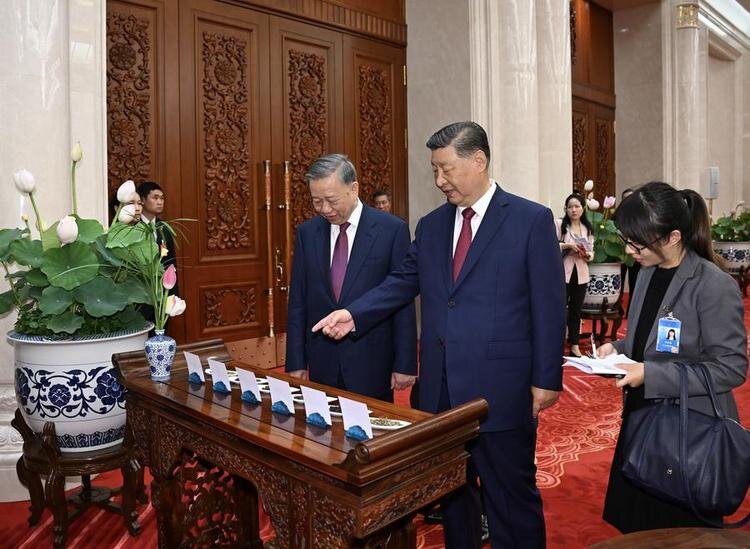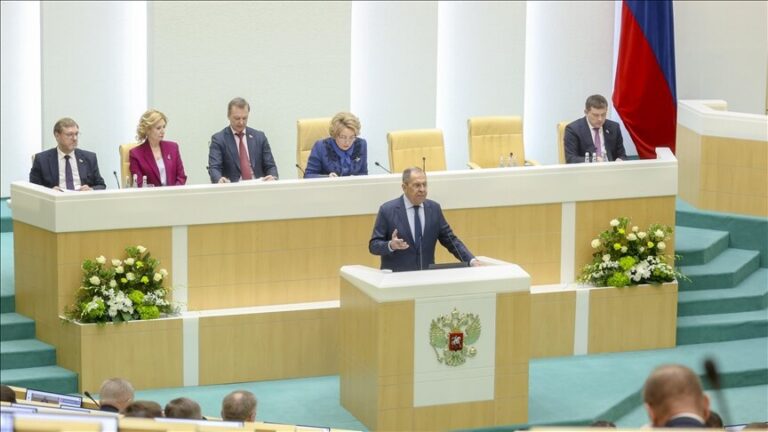Brewing Bonds: Xi’s Tales of Tradition and Tea with Vietnam’s Future
In a significant diplomatic gesture, Vietnam’s top leader, To Lam, embarked on a pivotal visit to China, highlighting the strong historical ties and enduring friendship between Vietnam and China. This visit comes as both nations celebrate the 75th anniversary of their diplomatic relations, marking a milestone in their shared journey as “comrades and brothers.”
To Lam’s trip began in Guangzhou, a city of historical importance where Ho Chi Minh, the respected Vietnamese leader, initiated his revolutionary journey in China. Chinese President Xi Jinping described this choice as “quite meaningful,” emphasizing the rich “shared red memory” that binds the ruling parties of both countries.
As Xi prepares for his fourth state visit to Vietnam, he sees this occasion as an opportunity to reflect on the past and inspire future relations. The visit represents more than just a diplomatic formality; it symbolizes the commitment to uphold the enduring friendship between China and Vietnam.
Historical Context of China-Vietnam Relations
During a previous visit to Vietnam in 2017, Xi Jinping presented a unique gift: 19 issues of The People’s Daily, the official newspaper of the Communist Party of China (CPC) Central Committee. Among these were 16 copies that featured stories about Ho Chi Minh, including a notable edition from June 26, 1955, showcasing Ho with prominent CPC leaders, Mao Zedong and Zhou Enlai.
Ho Chi Minh, who founded the Communist Party of Vietnam (CPV), developed close personal relationships with Chinese leaders during his revolutionary activities. Xi highlighted this bond, stating, “He was like a brother for Chairman Mao Zedong, Premier Zhou Enlai, and other Chinese leaders.” This sentiment underlines the profound historical connections that continue to influence their current diplomatic engagement.
Building on a Legacy
Xi’s admiration for Ho Chi Minh is evident in his actions. On multiple occasions, he has visited Ho’s former residence, reflecting on the lessons from the past that can guide their future. In 2011, Xi left an inscription at Ho’s home, stating, “The great man’s spirit shall be honored for millennia, and the China-Vietnam friendship shall endure through the ages.”
During these visits, Xi has often quoted Ho Chi Minh’s words, emphasizing the fraternal ties between the two nations. In a speech to Vietnam’s National Assembly in 2015, he reiterated, “China and Vietnam enjoy comradely and brotherly friendship.”
Tea Chats: A Symbol of Friendship
During To Lam’s 2024 visit, Xi hosted a tea gathering at the Great Hall of the People, showcasing the cultural significance of tea in both nations. This tradition of tea chats has become a distinctive practice during bilateral interactions, allowing for a more personal exchange between leaders.
- Tea chats facilitate intimate discussions compared to formal meetings.
- Gift-giving during these gatherings fosters lasting memories.
- Both nations share a rich cultural heritage, reflected in their similar tea traditions.
During a tea gathering in 2023, former Vietnamese leader Nguyen Phu Trong presented Xi with a painting that depicted a previous tea chat, emphasizing the value of their brotherhood. In a similar vein, Xi gifted Trong a replica of Ho Chi Minh’s handwritten poem, “Walking,” symbolizing their shared commitment to bilateral ties.
Encouraging the Next Generation
The significance of youth in strengthening the China-Vietnam relationship was highlighted during Xi’s state visit in 2023. A special meeting gathered young representatives from both countries, where Xi urged them to take the lead in promoting friendship as “frontrunners.”
Among the attendees was Le Nguyet Quynh, a Vietnamese student at Tsinghua University. She shared her impressions of Xi, calling him “kind, tall and dignified.” Quynh’s journey from Nghe An province, the birthplace of Ho Chi Minh, to studying in China reflects the growing educational ties between the two nations.
Currently, approximately 20,000 Vietnamese students are pursuing their education in China. This trend is mirrored by an increasing number of Chinese students studying in Vietnam, illustrating the cultural exchange and mutual understanding between the two peoples. Quynh emphasized the importance of youth in maintaining the friendship, stating, “It’s indeed us the youth who should carry that responsibility forward.”
Conclusion: A Shared Future
As China and Vietnam navigate the complexities of the modern world, their historical ties provide a strong foundation for future collaboration. Both nations are committed to fostering their friendship, understanding that amity between nations begins with the connections between their peoples. The upcoming state visit by Xi Jinping is not just a celebration of the past but a strategic step towards building a shared future.






